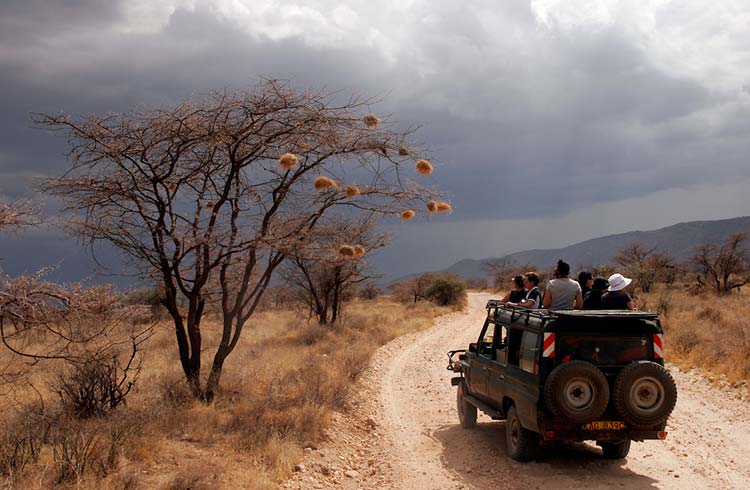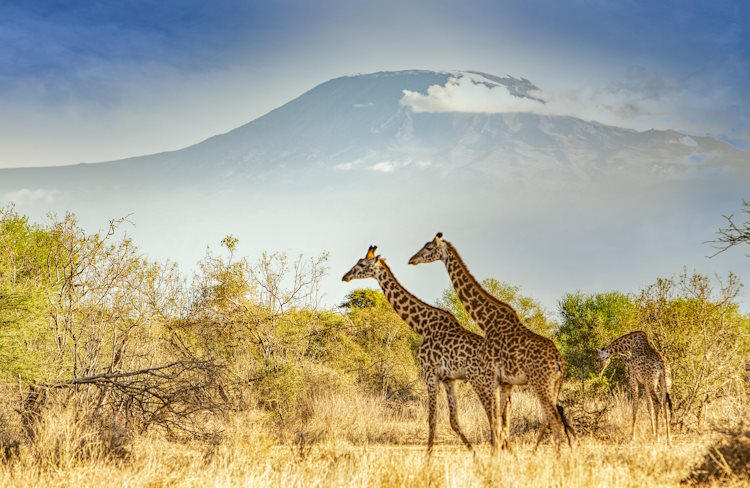Kenya Safari Tips: Where to Go and How to Stay Safe
Our safety expert shares the basic rules of a wildlife safari in Kenya. Find out why you should always listen to your guide, how to get great photos, and how to stay healthy.
 Photo © World Nomads/Trent O’Donnell
Photo © World Nomads/Trent O’Donnell
Spotting big game in Africa is one of the great travel adventures. You'll be overwhelmed when you spot your first lion, elephant, or giraffe. It’s magical, but it also can be dangerous. No matter where you go in sub-Saharan Africa, there are rules you must follow when in the bush.
- Staying safe on a Kenya safari drive
- Safety while camping on safari
- Staying healthy on safari
- Tips for spotting wildlife in Kenya
- Tips for great safari photography
- Top safari spots in Kenya
Staying safe on a Kenya safari drive
Here are some basic rules:
- Always stay in the van, truck or 4WD – Africa is not a zoo, and its animals are far from tame. There have been many terrible incidents where people got out to try and grab the perfect photo.
- Never turn your back on a wild animal or start running. The only thing that turns and runs in Africa is prey, so lions will chase you.
- Listen to your guide – they know when a situation is safe and when it’s dangerous. If your guide advises you to move on or back away, do so.
From Botswana to Kenya, South Africa to Uganda, rules vary depending on the landscape and wildlife. But they are aimed at keeping you safe, keeping the animals safe, and providing the best possible experience for visitors.
Safety while camping on safari
One of the true great experiences of being on a safari is sleeping under the stars. Falling asleep to the roar of a lion, the chattering of hyena or the grunt of a hippo is unforgettable.
But along with the joys there are risks. Here are the rules to follow:
- Go with a reputable, responsible tour operator.
- Zip up your tent (animals won't walk into your tent if it's secure).
- Don‘t walk around at night. If you need to leave your tent, be sure to go with an escort.
- Don‘t take food to your tent or leave anything outside your tent that will attract interest from animals.
If you think these rules are a bit extreme, wait until you see the footprints around your camp the next morning.
Staying healthy on safari
Being in the wild will bring you in contact with a variety of possible infections: malaria, yellow fever, and dysentery are just a few of the diseases you can pick up. Make sure your vaccinations are up to date, and follow these precautions against insect bites:
- Wear long loose-fitting, long-sleeved, light-colored clothing
- Put insect repellant on exposed skin – day and night
- Sleep under nets or have insect repellent in your room
Tips for spotting wildlife in Kenya
The best game parks don’t have fences – they are sweeping plains where animals roam free. So, spotting a lion, elephant, rhino, leopard, or cheetah is not guaranteed. Here are some ways you can increase your chances:
- Go with a trusted guide – someone who knows the terrain, the best areas, and the movement of the animals.
- Keep your voice down – animals scare easily, and you wouldn't want to miss a pride of lions because you are chatting too loudly.
- Don't expect to see everything in one safari – you can spend months in the African bush and still see new animals each time you visit.
- Pick your optimal time of year. If you have limited time, go during the dry seasons (June-October or Jan-March) when vegetation is sparse and animals gather around water sources.
- Keep your eyes open – sometimes it’s best to wait for the animal to come to you. After a few game drives, your eyes will become sharp and you’ll spot game everywhere.
- Listen. You aren't the only ones on the lookout for the big predators – smaller, less aggressive creatures are also watching their backs. Bird calls, animal noises and strange silence can all mean a lion is lurking nearby.
Tips for great safari photography
Kenya is a photographer’s dream, from the lions, rhinos, elephants, and giraffes you’re likely to see to the colorfully dressed tribes of the Masai Mara, You don‘t want to get substandard photos or miss that epic shot because your battery has died or you spook the wildlife.
Here are some simple tips to get you started:
- Before you go, buy a good camera, learn how to use it, and make sure it's charged before you venture out.
- Carry some extra batteries as it's likely you’ll use the camera more than you might anticipate. (Just remember to charge those too.)
- Carry extra SD cards and storage so you can take as many photos as you like.
- If you are out at night, don't use flash – that’s a sure-fire way to scare animals off.
- Embrace the light and use it to your advantage. Photos are best taken in the early morning or late afternoon. Everyone wants that amazing sunrise/sunset shot of Africa, right? Plus, animals tend to be more active at dawn or dusk.
- Be patient. The animals are doing their own thing and aren't there to pose for the safari tours. Spend time observing the animals to understand and appreciate their behavior.
- Don't just take photos of the animals. Africa is sensory overload so look for details like animal tracks – the landscapes themselves are pretty spectacular, too.
- Don’t view the whole trip through your viewfinder – remember to put the camera down and simply experience the wonders of Africa.

Top safari spots in Kenya
Each of these safari destinations in Kenya is unique and will provide you with an unforgettable experience.
Masai Mara
Kenya is the end point for the famed Great Migration – an event of such epic proportions that it has cemented its place in David Attenborough documentaries.
Each year, at least 2 million wildebeest are joined by zebras, gazelles and other antelope species to migrate from the Ngorongoro Crater in Tanzania, crossing rivers along the way to the rich grasslands in the Masai Mara National Park in Kenya. In hot pursuit are the predators like lions, crocodiles, hyena, and wild dogs taking advantage of the abundant food which gives any safari seeker an opportunity to see a kill in action.
Best time to visit: Wildlife can be seen all year around but June to October is generally the best. If you want to catch the height of the Great Migration, visit during September-October.
Tsavo National Park
The largest protected area in Kenya, Tsavo is home to the big animals like hippos, rhinos, giraffe, elephants, lions, and prolific bird life such as secretary birds, hornbills, ostrich, hoopoe and many more.
Best time to visit: During the drier months – January-February along with July to October.
Amboseli National Park
The second most-visited park after Masai Mara, this is where you can get those magnificent shots of Mount Kilimanjaro with elephants hanging out in the foreground. Four of the Big 5 live here (sorry, no rhinos) and if you love those grey giants (elephants) this is the place to see them.
Best time visit: January-February and June to September.
Tip: If you want that spectacular Kilimanjaro/animal photo, it's best taken in the early morning.
Lake Nakuru National Park
A UNESCO World Heritage Site, this alkaline lake is famous for its vast flocks of flamingos. Tens of thousands of these flamboyant pink birds call the lake home.
This is also the place to see black and white rhinos, the endangered Rothschild giraffe, hippos wallowing in the water, and predators like lions and leopards.
Best time to visit: July-February.
Related articles
Simple and flexible travel insurance
You can buy at home or while traveling, and claim online from anywhere in the world. With 150+ adventure activities covered and 24/7 emergency assistance.
Get a quote

No Comments